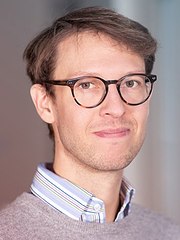Philipp Jacobi

Photo: Katja Klein
Research Associate
Humanities Centre for Advanced Studies "Futures of Sustainability"
Address
Office
Contact
About me
I hold a B.A. in Philosophy, Politics and Economics from the University of Witten/Herdecke and an M.A. in Political Theory from Goethe-University Frankfurt. During my masters I was a student assistant at the „Normative Orders“. I also went to Paris for an Erasmus in sociology at the EHESS. My master thesis was about how the readings of Bruno Latour could be made fruitful to the discussions at the research group on post-growth at the Friedrich-Schiller-University in Jena. My current research interests include STS, political economy, indigenous knowledge, degrowth and human-animal studies.
Research
The biodiversity crisis is pushing sociology to examine current relationships to other species and explore how they might be improved. My doctoral project tries to learn about conflicting „futures of sustainability“ from a less anthropocentric point of view. This is done on the grounds of a more-than-human ethnography in the North of Sweden, also known as Sápmi. The region is, amongst others, home of the Sámi, the only indigenous people in Europe. At the same time, it is also a treasure chamber filled with resources for the European green deal. What is there to learn if one studies the emerging land-use conflicts by paying attention to other-than-human species?
The Times They Are A-Changin’
PDF, 13.05.2025
Modern societies change very rapidly, and this also impacts sociological PhD-projects. A thesis can seem outdated even before its publication, if the premises it was based upon are no longer valid. Thankfully, an ethnographic research project is by design flexible enough to deal with changing assumptions. One of the premises that I started my PhD with three years ago was that green “modernization” was the hegemonic “Future of Sustainability” in the Global North. Ursula von der Leyen’s European Green Deal (EGD) and Joe Biden’s Inflation Reduction Act (IRA) were powerful manifestations of the attempt to make growth-driven capitalism sustainable. From a Degrowth-perspective (which I share) this could never suffice to respect the planetary boundaries. There is simply not enough evidence, that growth and negative environmental impacts can be sufficiently decoupled to preserve the conditions of life around the globe. Hence, I viewed green modernization as the principal object of critique.
Such critique is, of course, still relevant. The flaws and weaknesses of the green growth promise are far-reaching, I witness this in my fieldwork in Sápmi.[1] However, green modernization is no longer the undisputed hegemon. The Trump administration has frozen funding for the IRA, leaving its future uncertain. In Europe, environmental regulations under the EGD are being rolled back in the name of reducing bureaucracy and promoting growth. As I write this text, right wing MEPs are teaming up against the Habitats Directive, which seeks to preserve and restore biodiversity in Europe. In March, Roland Kulke from Transform!Europe presented at our workshop “Degrowth and Planning”. He described to us how the EVP majority is doing everything in their power to exclude green NGOs and unions from the choreography of decision-making processes. Now it seems as if many politicians prefer to promise only growth and that is worse.
For the growing far-right, ecological concerns are best dealt with by blaming those who dare to raise them. Cassandra is the problem, not the Trojan horse! Denial is a psychologically attractive reaction to the multiple ecological crisis we face. To put it in Ulrich Brand’s terms, one of our visiting fellows, it allows people to continue an “imperial mode of living” without pricks of conscience. A rather different reaction is to acknowledge the reality of climate change and species extinction - and to lose hope about it. Cassandra got it right, but her prophecy seems to leave no agency to prevent the worst from happening. At the already mentioned workshop, Kohei Saito for example suggested that the best we can hope for is an authoritarian state that imposes a war time economy, rationalizing and distributing scarce goods.
From my point of view, a transformative intervention should criticize the pathway to green modernization, but it ought to treat policy programs like the EGR in a more nuanced way. Now that it is threatened by the EVP and the far-right, one begins to appreciate that parts of it are at least going into the right direction. For example, the EU managed to reduce its CO2-emissions by more than 30 percent since 1990. Furthermore, I see it as part of our job to look out for more desirable futures than an authoritarian war-time economy. Such “lazy catastrophism” only discourages people to work towards a livable future.
Bob Dylan’s song, which lends this article its name, serves as a reminder that the future is unpredictable and surprising—and that this is not necessarily a bad thing: “Come writers and critics who prophesize with your pen, keep your eyes wide, the chance won’t. come again. And don’t speak too soon, for the wheel’s still in spin. And there’s no tellin’ who that it’s namin’. For the looser now will be later to win. For the times—they are a-changin’.”
[1] In the Land of the Sami in Sweden, industries have found new justifications to take more land, destroying ecosystems and violating human rights. This is not to say that it is generally a bad idea to decarbonize the steel production, to build windmills or to manufacture EV-batteries. But within a logic of growth, there can never be enough of it until all the old forests are clearcut and the reindeer starve to death.
